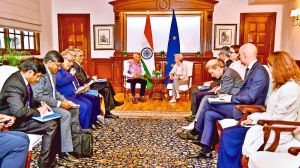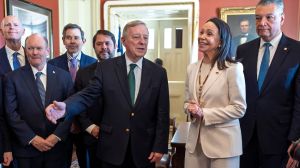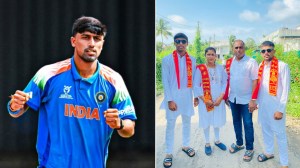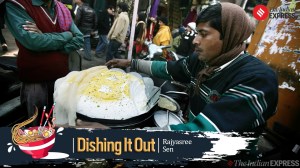Stridently Sonia
Sonia Gandhi has taken her time to return the BJP's fire and in the event been content with delivering a few withering remarks about its ...

Sonia Gandhi has taken her time to return the BJP8217;s fire and in the event been content with delivering a few withering remarks about its decidedly low-level tactics. Her major emphasis has rightly been on political stability as the country goes into a third election in three years. The Congress party8217;s emerging strategy of contesting the Lok Sabha polls on its own for the most part and making stability the key campaign issue makes complete sense. In contrast to the BJP which is presently boxed in by hasty efforts to capitalise on 8220;betrayal8221; and put together an unwieldy 18-party or possibly larger conglomeration, the Congress has given itself room for manoeuvre on a platform of stability and secularism. Even as it looks for State-level alliances in UP, Bihar and Tamil Nadu where it has only a small foothold, the Congress can maintain the stance of a national party with its own agenda. If it starts with the conviction that it has what it takes to offer India a stable government on its own, chances are it willpersuade others, voters and minor allies, to think likewise.
The Congress recognised as far back as Pach-marhi that coalitions were not workable for itself or for the country and that the party must be prepared to go it alone. True, Sonia Gandhi weakened at the first whiff of gunpowder. But her experiences in the scramble for numbers after the Vajpayee government fell should stiffen her resolve as indeed appears to be the case judging by her address to the CWC and other party bosses and the continuing harsh attack on Mulayam Singh Yadav. Another lesson hopefully relearned is that the Congress party today is not and cannot be a family heirloom. Nor is Sonia Gandhi Indira Gandhi. The indications are of a return to broad-based consultations within the organisation. Collective leadership will stand the party in good stead. Even without the joint exertions of the BJP, Sangh Parivar and Telegu Desam to stick a videshi label on her, Sonia Gandhi ought to know her limitations and understand where the party8217;s real strengths lie.
If the Nehru-Gandhi mystique played a part in the Congress8217;s good fortunes in the last Assembly elections, it played but a small part. Disenchant-ment with the BJP and, very tellingly, the Congress record and campaign under Digvijay Singh in Madhya Pradesh, were more decisive. What better way to confound the Sonia-centred campaigners of the BJP than to present a forceful Congress team? In its Manmohan Singhs, Sharad Pawars, Digvijay Singhs et al, the Congress has talent, experience, administrative ability and proven vote-getting powers. They should together with Sonia Gandhi be the public face of the party. Organisa-tional reform was supposed to produce a party which could go to the people with all guns firing. Thus far it still appears uncertain of itself. It should pay closer attention to its critics.
Mulayam8217;s intransigence is not so much a betrayal of the secular cause as a backhanded compliment to the Cong-ress whose prospects in UP few had hitherto rated highly. Chandrababu Naidu8217;s virulent noises are an expression of his fears. Why is the BJP suddenly reaching for Bofors? The Congress may have more going for it than it realises.
- 01
- 02
- 03
- 04
- 05































